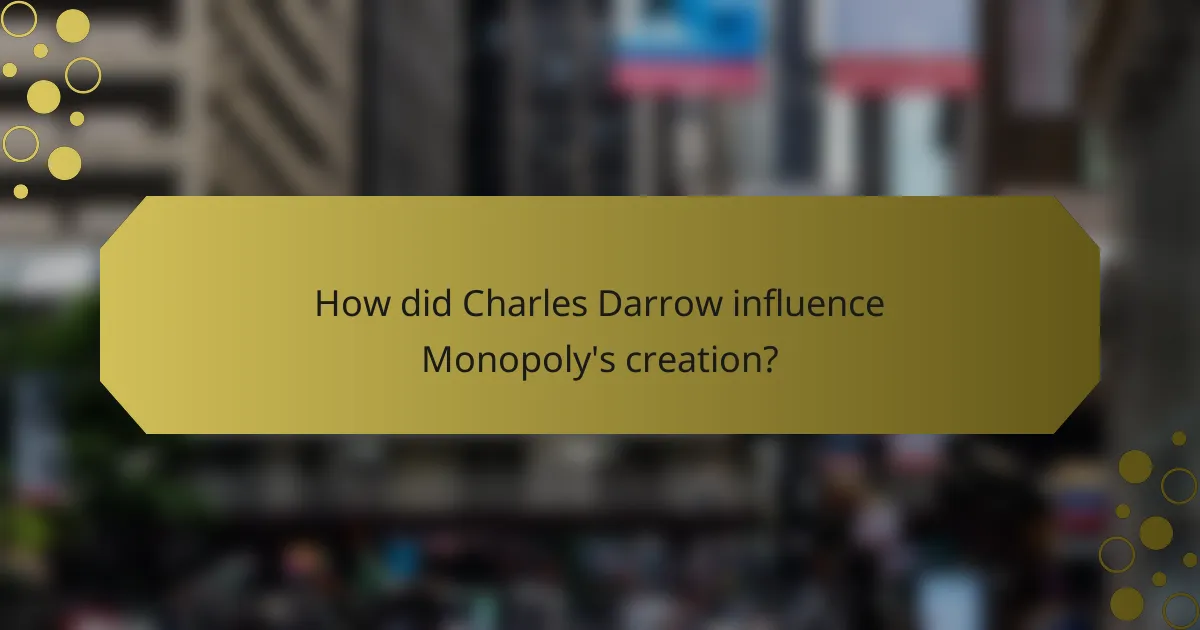Charles Darrow was instrumental in the creation and popularization of Monopoly, transforming it from an obscure game into a cultural phenomenon. His background as a heating engineer and experiences during the Great Depression fueled his innovative marketing strategies, which overcame initial rejections and financial hurdles. Through perseverance and creativity, Darrow turned Monopoly into a commercial success that continues to captivate players worldwide.

How did Charles Darrow influence Monopoly’s creation?
Charles Darrow played a pivotal role in the development of Monopoly by transforming it from a lesser-known game into a commercial success. His innovative approach and marketing strategies helped popularize the game, leading to its widespread adoption.
Inventor of Monopoly
While Charles Darrow is often credited as the inventor of Monopoly, he actually adapted the game from earlier versions, notably “The Landlord’s Game” created by Elizabeth Magie. Darrow’s version included unique elements like the iconic game pieces and the familiar board layout, which contributed to its appeal.
His modifications focused on enhancing gameplay and making it more engaging for players. For example, he simplified the rules and introduced the concept of buying and trading properties, which became central to the game’s strategy.
Introduced game to Parker Brothers
Darrow’s introduction of Monopoly to Parker Brothers marked a significant turning point in the game’s history. After initially facing rejection, he persisted and eventually convinced the company to publish it, highlighting its potential as a family-friendly game.
Once Parker Brothers took over, they refined the game further and launched a successful marketing campaign. This collaboration transformed Monopoly into a household name, leading to millions of copies sold worldwide and establishing it as a classic board game.

What was Charles Darrow’s background?
Charles Darrow was an American game designer best known for his role in the development of the board game Monopoly. His background as a heating engineer and his experiences during the Great Depression influenced his creativity and business acumen, ultimately leading to the game’s success.
Born in Pennsylvania
Charles Darrow was born in Pennsylvania in the late 1880s. Growing up in a working-class family, he faced financial challenges that shaped his perspective on money and success. This upbringing played a crucial role in his later creation of a game centered around property trading and wealth accumulation.
Worked as a heating engineer
Darrow worked as a heating engineer, a profession that provided him with a steady income but limited creative outlets. His engineering background helped him develop a methodical approach to problem-solving, which he later applied to game design. During the Great Depression, he sought additional income through his passion for creating games, leading to the initial concept of Monopoly.

What challenges did Darrow face in developing Monopoly?
Charles Darrow encountered significant challenges in developing Monopoly, including initial rejections from game publishers and financial difficulties during the Great Depression. These obstacles shaped the game’s evolution and ultimately contributed to its success.
Initial rejection by game publishers
Darrow faced multiple rejections from established game publishers who did not see the potential in his board game concept. Despite his persistence, many companies considered the game too complex or unappealing for the market at the time.
This lack of interest forced Darrow to take matters into his own hands, leading him to produce homemade versions of the game. He used materials like cardboard and paint to create a prototype, which he then shared with family and friends to gather feedback.
Financial struggles during the Great Depression
The Great Depression severely impacted Darrow’s financial situation, making it difficult for him to invest in the game’s production and marketing. Many families were struggling economically, which influenced their leisure activities and spending habits.
To navigate these challenges, Darrow focused on the game’s appeal as a means of escapism during tough times. He emphasized the themes of property ownership and economic success, which resonated with players looking for hope and entertainment amidst widespread hardship.

How did Darrow’s version differ from earlier games?
Darrow’s version of Monopoly introduced significant changes that set it apart from earlier board games. His adaptation emphasized real estate investment and property management, making the gameplay more strategic and engaging for players.
Incorporated real estate themes
Darrow’s Monopoly focused heavily on real estate themes, allowing players to buy, sell, and trade properties. This shift made the game more relatable, as players could experience the ups and downs of property ownership. The inclusion of properties based on real locations in Atlantic City added a layer of authenticity and connection to the game.
The gameplay mechanics encouraged players to invest in properties, develop them with houses and hotels, and collect rent from opponents. This system created a competitive atmosphere, where strategic decisions about property management could lead to financial success or bankruptcy.
Added iconic game pieces
Darrow’s version of Monopoly introduced iconic game pieces that have become synonymous with the game. Players can choose from a variety of tokens, such as the top hat, thimble, or racecar, which add a personal touch to the gameplay experience. These pieces not only serve as markers on the board but also enhance player engagement and enjoyment.
The selection of game pieces has evolved over time, but the original tokens contributed to the game’s charm and appeal. This personalization aspect helped differentiate Monopoly from earlier games, making it more memorable and enjoyable for players of all ages.

What impact did Monopoly have on American culture?
Monopoly has significantly influenced American culture by becoming a symbol of capitalism and shaping family interactions during game nights. Its themes of wealth, property ownership, and competition resonate deeply with American values, making it a staple in households across the country.
Symbol of capitalism
Monopoly is often viewed as a representation of capitalism, illustrating the principles of free market competition and wealth accumulation. Players engage in buying, trading, and developing properties, reflecting the pursuit of financial success and the American Dream.
The game’s mechanics encourage strategic thinking and negotiation skills, mirroring real-world economic practices. This connection to capitalism has made Monopoly a topic of discussion regarding wealth disparity and economic ethics in society.
Influenced family game nights
Monopoly has transformed family game nights into a platform for social interaction and bonding. The game’s blend of strategy, chance, and negotiation fosters communication and teamwork among players, making it a popular choice for gatherings.
Many families have created traditions around playing Monopoly, often leading to friendly rivalries and memorable experiences. Its accessibility and engaging gameplay ensure that it remains a beloved choice for both children and adults, reinforcing family ties through shared enjoyment.

What are the key attributes of Monopoly?
Monopoly is characterized by its blend of strategy, chance, and negotiation, where players aim to accumulate wealth through property acquisition and management. Key attributes include gameplay mechanics that involve rolling dice, trading properties, and managing finances, alongside a distinctive game board design featuring various properties and spaces.
Gameplay mechanics
The gameplay mechanics of Monopoly revolve around rolling two six-sided dice to move around the board, landing on properties, and making strategic decisions about buying, trading, and developing real estate. Players must manage their cash flow carefully, balancing investments in properties with the need to pay rent and avoid bankruptcy.
Key actions include purchasing properties when landed on, paying rent to opponents when landing on their owned properties, and drawing Chance or Community Chest cards that can alter the game dynamics. Players often negotiate trades to enhance their portfolios, making negotiation skills crucial for success.
Game board design
The game board design of Monopoly features a square layout with 40 spaces, including properties, railroads, utilities, and special spaces like Jail and Free Parking. Each property is color-coded and has a unique value, influencing its desirability and rental income potential.
Players can develop properties by purchasing houses and hotels, which increases rent significantly. The design also includes spaces for Chance and Community Chest cards, which introduce elements of surprise and strategy, impacting players’ fortunes throughout the game.

How has Monopoly evolved since Darrow’s time?
Monopoly has undergone significant changes since Charles Darrow’s initial version, adapting to cultural shifts and market demands. The game has seen updates in rules, themes, and editions, reflecting contemporary interests and values.
Changes in Game Design
Since its inception, Monopoly’s design has evolved to include various themes and special editions, such as city-specific versions and collaborations with popular franchises. These adaptations cater to diverse audiences and keep the game relevant in a rapidly changing entertainment landscape.
Additionally, game mechanics have been refined. For example, the introduction of house rules and variations allows players to customize their experience, making the game more engaging for different groups.
Digital Transformations
The transition to digital platforms has revolutionized how Monopoly is played. Online versions and mobile apps have made the game accessible to a broader audience, allowing for multiplayer experiences across distances. These digital adaptations often include features like automated banking and enhanced graphics.
Moreover, digital versions frequently introduce new gameplay elements, such as timed rounds or unique challenges, which can alter traditional strategies and enhance replayability.
Global Variations
Monopoly has been localized for various markets, resulting in unique versions that reflect local culture and landmarks. For instance, Monopoly: London features iconic locations from the city, while Monopoly: Paris showcases French landmarks.
These global variations not only appeal to local players but also educate others about different cultures, making the game a tool for cultural exchange.
